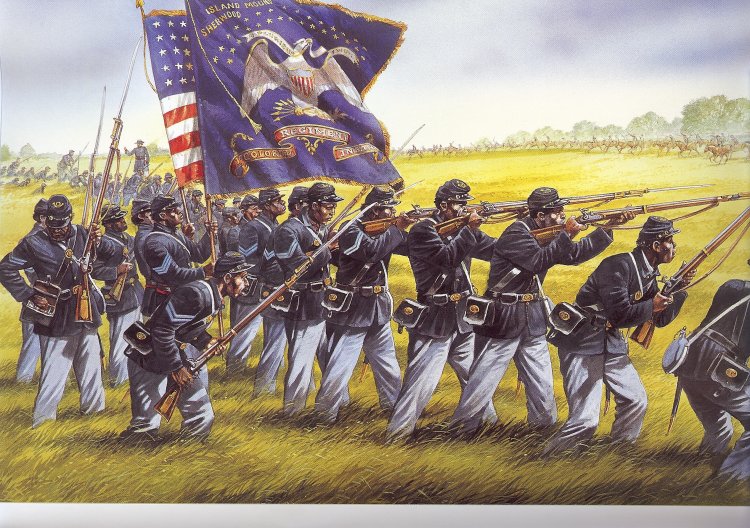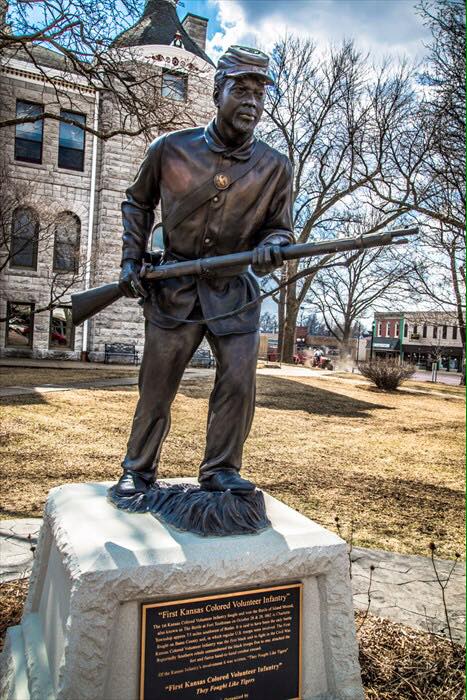The Army of Northern Virginia was breaking camp. The lean, ragged soldiers, their gray uniforms and especially their shoes much the worse for wear, began the next long tramp, this one north and west toward Hagerstown. They were profoundly--and profanely-- glad to be getting away from Frederick.
"That 'Bonnie Blue Flag', that ain't nothin' but a damn pack o' likes," a corporal announced to anyone who would listen as he slung his haversack over his shoulder.
"You'd best believe it is," one of the privates in his company agreed, pausing in the middle of the agreement to spit a brown stream of tobacco juice from the chaw that bulged out his left cheek. "This here miserable Frederick town, it ain't nothing but a stinkin' ol' city full of damnyankees. Sons of bitches wouldn't take our money, wouldn't open up their stores so as we could get the supplies we needed, wouldn't--"
Taking a corporal's privilege, the corporal interrupted:" You can't even get into that there town without you have a letter in writin' from your officer, says you can. Otherwise, them lousy provost guards, they'd just as soon arrest you as look at you, goddamn miserable snoops. Hear them talk, you'd think we was the ones in Yankee uniform."
"Hell, I am in a Yankee uniform--Yankee trousers, anyways," the private answered. "The Northern fellow I took 'em off, he didn't need 'em no more."
The courier's horse daintily picked its way through the chaos, careful where it set its feet. The lieutenant aboard the bay gelding didn't blame the animal for that; once an army had camped in a field, it wasn't a pleasant place any more, no matter how pleasant it might have been to start out with. They said that, once you'd been encamped for a while, you stopped noticing the stink. The lieutenant wrinkled his nose. He'd never found that to be true. Every time he breathed in, he smelled the slit trenches (and the men hadn't been all that careful about using them; this was, after all, Yankee country), horse manure, thousands of bodies that had done a heap of hard marching without baths any time lately, and the choking smoke from thousands of little fires. The good odors of cooking food, coffee, and tobacco had to fight hard to make themselves noticed against all that.
"Lieutenant!" somebody called from behind him. "Hey, Lieutenant!". The courier paid no particular attention. The Army of Northern Virginia wasn't as big as it should have been, but it was big enough to have a hell of a lot of lieutenants.
Then the call got more specific: "You there, Lieutenant, up on the bay-- hold on, will you?"
The courier reined in and looked back over his shoulder. "You want me?"
"No-- your cousin back in Richmond." The corporal who'd been grousing about the provost guards grinned impudently up at him. Getting men to give officers the respect their rank deserved was a battle the army hadn't won yet and wouldn't any time soon. The courier was about to tell the infantryman off when the fellow held up a fat white envelope, now somewhat stained with mud. "You dropped this, sir."
"Good God!" the courier felt woozy, light-headed. "Give it to me!"
"Here you go." The corporal handed it to him. He cocked his head to one side. "You all right, Lieutenant?" You don't mind me sayin' so, you look white as a ghost, you do."
"I believe it.". The Lieutenant clutched the envelope as if he were a drowning man and it a plank. "Do you know what's in here?"
"Cigars, felt like," the corporal answered with the casual expertise of a man who'd done a good deal of foraging.
"Cigars it is." The courier opened up the envelope and took them out. There were three, all of them nice and long and thick. He handed the corporal the biggest one. "Here-- this is for you." The next one went to the private with whom the fellow had been grumbling. "And this is for you." He stuck the third into his mouth.
"Obliged, sir." The corporal walked over to the nearest fire, stuck a twig in it, and got his cigar going. He came back pugging happy clouds and leaned close to the private so he could start his. Then he came up to the courier. After he'd given him a light, he remarked, "That's good baccy, but it don't seem enough to be makin' such a much of a much over, like you was doin'."
"No?" The lieutenant's laugh was the high, sweet sound of pure relief. "Do you know what was wrapped around those cigars?".
The corporal shook his head. "Can't say as I do. Reckon you're gonna tell me, though, so that's all right."
"Oh, nothing much," the courier said, and laughed again. "Only a copy of General Lee's Special Order 191, that's all. Only the orders that say where every division in the Army of Northern Virginia's supposed to be going, and what it's supposed to do when it gets there."
The private shifted the cigar to the corner of his mouth and spoke up: "That don't sound like it'd be somethin' you'd want to lose."
"Not hardly!" The lieutenant tried to imagine what would have happened to him if General Lee found out he'd lost the order. Appalling as that notion was, an even worse one replaced it, one so horrific he said it out loud, as if to exorcise it: "If McClellan's men picked up that envelope, they'd know exactly what we were aimed to do, and they'd be able to break us right up."
"Damn fine thing we got it back to you, then," the corporal said. "You hang on to it from here out, you hear?" He touched a forefinger to the brim of his black felt hat. "And I do thank you kindly for the cigar. That was right good of you." Behind him, the private nodded.
"I'm the one who needs to thank you," the courier said. "Hell's fire, gentlemen, the Confederate States of America might have lost the whole war if you hadn't found that envelope." He waved his gratitude once more, then used the pressure of his legs and a flick of the reins to get his horse moving.
The corporal and private looked after him till he disappeared into the midst of the disorderly throng of soldiers. "Lost the whole war," the corporal echoed scornfully. "He don't think much of himself and the papers he carries, now does he?"
"Ahh, he wasn't a bad feller," the private answered. "He gave us these here cigars, an' he didn't have to do that." He tilted his head back and blew a ragged smoke ring.








